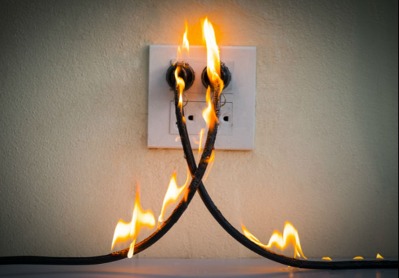
Though we all use electrical currents in our homes, we often forget it can cause power surge.
Electrical surges can cause severe hazards, ranging from fire outbreaks to damage to electrical appliances.
But when you know what causes the transient and how to prevent it, your home will be safe.
In this article, we will talk about the power surge causes and prevention methods.
What is a power surge?
Normally, the household appliance uses voltage between 110, to 220 volts. But when power surges occur, it jumps beyond normal.
Any voltage that is beyond the household rating is called a surge.
Transient voltage can be large or small and usually leads to reduced performance and damage of electrical equipment.
How does a power surge happen?
Surges may arise from power distribution companies during grid switching, it may also occur because of a malfunction of a nearby transformer, or during a lightning strike.
It can also happen in the house when you switch on or off a high-powered appliance such as a cooker unit or air conditioner. The motor and compressor of these devices require much energy to switch off and on, and the sudden power demand causes fluctuation in the flow of electricity along the electrical system.
What are the causes of the power surge?
Common causes of power surge include:
Circuit overload
Electrical overload occurs when you plug too many or large appliances into one circuit or an extension cord.
These devices draw large power from the circuit, leading to the surge.
Wrong wiring
This can also cause electrical surge, especially when there is partial contact between the damaged or exposed wires.
Faulty wiring can be hard to trace, especially in conduit wiring, however, you can still use signs to check if that is the cause.
The signs include: Burning smell coming from the outlet, circuit breaker continues to trip, burning mark on the outlets or device, and others.
If you notice any of these signs, turn off the branch circuit and contact a qualified electrician for troubleshooting.
Lightning strike
During rainfall, lighting may strike power lines, creating excessive current on the circuit and appliances.
This spike can cause a power surge that may damage your appliances. That is why it is necessary to remove all devices and appliances connected to a circuit during rain or lightning, unless you have a surge protection device.
Restoration of lights after power outage
When power is restored to a circuit after failure, it is common to experience a sudden jump in voltage.
This surge can damage any device plugged into the circuit unless it has a surge protector.
Signs of a Power Surge
Below are the signs that your appliances may have experienced a power surge:
- Burning smell from the device or power source.
- Device clocking or flashing lights.
- Device stopped working.
- Surge protector is off.
How to prevent a power surge
To protect your home and electronic devices from a sudden surge, take these precautions.
Check for faulty wiring.
Substandard wiring can cause power surge when there is partial contact between damaged or exposed wires.
Make sure you have a qualified electrician who occasionally inspects your home’s wiring system for issues.
The technician will use the required test equipment to check for wiring faults, such as ground faults, wrong connection and others.
Unplug your electrical devices during storm.
Lighting may strike power lines during heavy pour and cause damage to electrical devices, so make sure you unplug your sensitive electronics during the rain to save them from damage.
Install surge protection devices.
Surge protectors protect your electronics from damage by blocking excessive current from reaching them.
They come in three different types, including power strips, surge protector wall outlets and whole home surge processors.
Make the right choice and save your home from surge.
Install modern AC units.
Modern air conditioners use less energy compared to older ones. This will reduce the spike in voltages when it goes off.
Modern ACs also reduce the money you spend on energy bills.
Conclusion
A power surge can cause severe damage to your home appliances, but there are ways to prevent it.
Go through the guidelines on how to prevent a power surge and choose the one that suits your home.
Install surge protector circuit breakers in your home, make sure your wiring system is standard, and avoid using your electronics during heavy pour, so your home will be safe.
For inspection, installation and troubleshooting of electrical problems, do contact us as we are here to serve you better.
Related articles